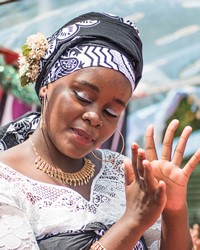Comorian, Maore in Eswatini

Photo Source:
Bertrand Fanonnel - Wikimedia
Creative Commons
|
Send Joshua Project a map of this people group.
|
| People Name: | Comorian, Maore |
| Country: | Eswatini |
| 10/40 Window: | No |
| Population: | 700 |
| World Population: | 224,400 |
| Primary Language: | Comorian, Maore |
| Primary Religion: | Islam |
| Christian Adherents: | 1.00 % |
| Evangelicals: | 0.20 % |
| Scripture: | New Testament |
| Ministry Resources: | Yes |
| Jesus Film: | Yes |
| Audio Recordings: | Yes |
| People Cluster: | Bantu, Swahili |
| Affinity Bloc: | Sub-Saharan Peoples |
| Progress Level: |
|
Introduction / History
The Mayotte Comorians are a blend of settlers from the past: Iranian traders, mainland Africans, Arabs, and Malagasy. Because of poor economic conditions, the islands receive monetary and technical support from other countries. Some seek their fortune in nearby countries like Eswatini, known as Swaziland until recent years. Mayotte Comorians live on a group of islands in the Indian Ocean between Madagascar and Mozambique, Africa. The Comoros chain consists of four main islands plus several smaller ones. Comorian communities can be found on all of the islands in the chain, as well as in Madagascar. The different Comorian groups take their name from the particular island on which they live. Thus, the Mayotte Comorians are those from Mayotte Island.
What Are Their Lives Like?
Most of these islanders work as farmers or fishermen, while a few raise cattle, sheep, goats, and donkeys. A small number work in industry or in jobs relating to tourism. The basic diet of the Comorians consists of rice, potatoes, corn, fish, coconuts, and bananas. Other crops that they grow are sweet potatoes, citrus fruits and pineapples. Although young people wear Western style clothing, traditional clothing is still common among the adults. In town, a Comorian man will typically wear a white cotton garment and a knee-length shirt, sometimes with a white jacket and a white skull cap. When he goes out of town, he wears a long cloth sarong (colorful skirt). Most women wear long, colorful cotton dresses, with bright shawls as face coverings. Other women prefer wearing black robes that cover their heads. Polygamy is an acceptable practice among Mayotte Comorians in Eswatini. Children are expected to help with the farming, fishing, and caring of the animals. For recreation, Mayotte Comorians enjoy dancing, singing, and playing instruments, especially horns and drums.
What Are Their Beliefs?
Mayotte Comorians are Sunni Muslims, yet mosque attendance is very low. Mixed with their Islamic practices is a strong involvement with traditional animistic religions, and spirit possession is one of the sad consequences of this. Traditionally, Mayotte Comorians have been very resistant to any kind of religious change; however, they are gradually becoming more receptive to other ideas.
What Are Their Needs?
The physical needs of the Maore Comorians are numerous, yet their spiritual needs are even greater. Though freedom of religion exists in Eswatini, evangelism is not well received by these Muslims. Their commitment to Islam coupled with involvement in occult practices has made these people difficult to reach. Christian resources are limited. Consequently, the number of Comorian believers remains small. Prayer is the first step toward seeing these people reached with the good news that Jesus Christ came to set them free from sin and death.
Prayer Points
Pray for gospel workers to catch a vision for reaching the Mayotte Comorian people for Jesus and that in God's sovereign timing their hearts would be open and ready to follow Him. Pray for Jesus movements to bless extended Mayotte Comorian families so the gospel will spread rapidly among this people group. Pray for the spiritual lives of the Mayotte Comorian people in Eswatini to become fruitful as they follow Christ. Pray for the lives and culture of the Mayotte Comorian people to evidence the rule and reign of the Kingdom of God as they open to the gospel, and for the beauty of Jesus to be seen in them.